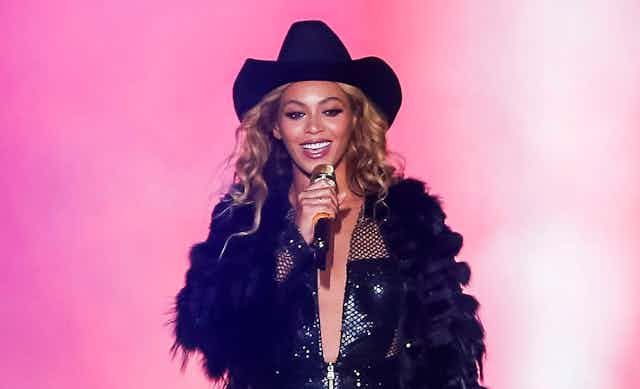The release of Beyoncé’s latest album, Cowboy Carter, was a much awaited event for a lot of us. There was much anticipation about this being a country album — and a lot of talk about the resistance some radio stations had and still have to that idea. That’s because country music is often falsely seen as “white music,” even though its Black historical roots are well documented.
But Beyoncé’s new album is so much more than a country album. It’s genre-defying: moving easily from country to 90s pop to 70s rock. It honours other Black musical legends, and challenges the segregation we still see and hear in the music industry today.

Today’s episode of Don’t Call Me Resilient gets into all of it, with two people who were also keenly awaiting this album’s drop.
Alexis McGee is an Assistant Professor of Writing Studies at the University of British Columbia. Her book is From Blues to Beyoncé: A Century of Black Women’s Generational Sonic Rhetorics.
Also joining the conversation is Jada Watson, Assistant Professor of Digital Humanities at the School of Information Studies at the University of Ottawa. Her current research, called SongData, uses data — like radio airplay, charts, and streaming numbers — to examine representation in the country music industry.

In our conversation, Watson, who studies music industry data, said that country music radio is currently playing Beyoncé in its daytime rotation — something she says is rare for Black female country artists. “But they’re only playing Beyoncé. They’re not also playing Tiera Kennedy, Tanner Adell, Reyna Roberts, Brittney Spencer, Mickey Guyton, Rissi Palmer. They’re not playing their music. So it’s really hard to be celebratory within the country industry space because it’s not creating pathways.”
McGee, who looks at the sonic rhetoric of Black women, says the story of Beyoncé’s album is still unfolding: “There’s a particular sound that she is leaning into in this album that I find so cathartic and I want to explore more because she’s changing something with her voice and I think we need to recognize that this is her range, this is who she is…but there’s also something different about it. She’s evolving. And it’s a great evolution.”
Resources
Beyoncé’s ‘Cowboy Carter’ is ‘absolutely magical’: Danyel Smith (interview with Danyel Smith by Jonathan Capehart)
Shine Bright: A Very Personal History of Black Women in Pop (by Danyel Smith, 2023)
For Love & Country (Joshua Kissi, 2022)
“Beyoncé Won’t Burn Down the Barn with ‘Cowboy Carter’” (The New Yorker by Doreen St. Félix)
Redlining in Country Music 2.0 (by Jada Watson)
Whose Country Music? (Edited by Paula J. Bishop & Jada E. Watson, Cambridge University Press, 2022)
“CMA responds to allegations it removed social media posts over Beyoncé performance backlash” (CNN)
Color Me Country by Rissi Palmer
Miss Rhythm: The Autobiography of Ruth Brown, Rhythm and Blues Legend (1996)
Tracks in the episode (in order of mention)
From the archives - in The Conversation
Read more: Charley Pride – country music has obscured and marginalised its Black roots
Listen and follow
You can listen to or follow Don’t Call Me Resilient on Apple Podcasts (transcripts available), Spotify, YouTube or wherever you listen to your favourite podcasts.
You can read the transcript of this episode here.
We’d love to hear from you, including any ideas for future episodes.
Join the Conversation on Instagram, X, LinkedIn and use #DontCallMeResilient.
Husein Haveliwala is our student intern and assistant producer. Jennifer Moroz is the consulting producer. Krish Dineshkumar is our sound editor.

